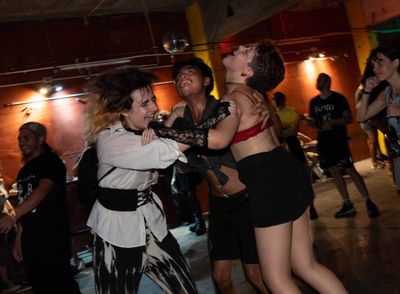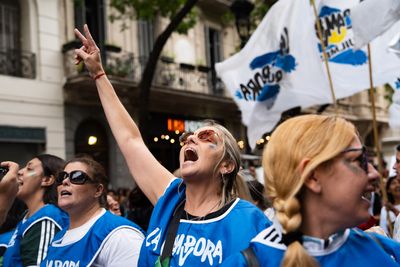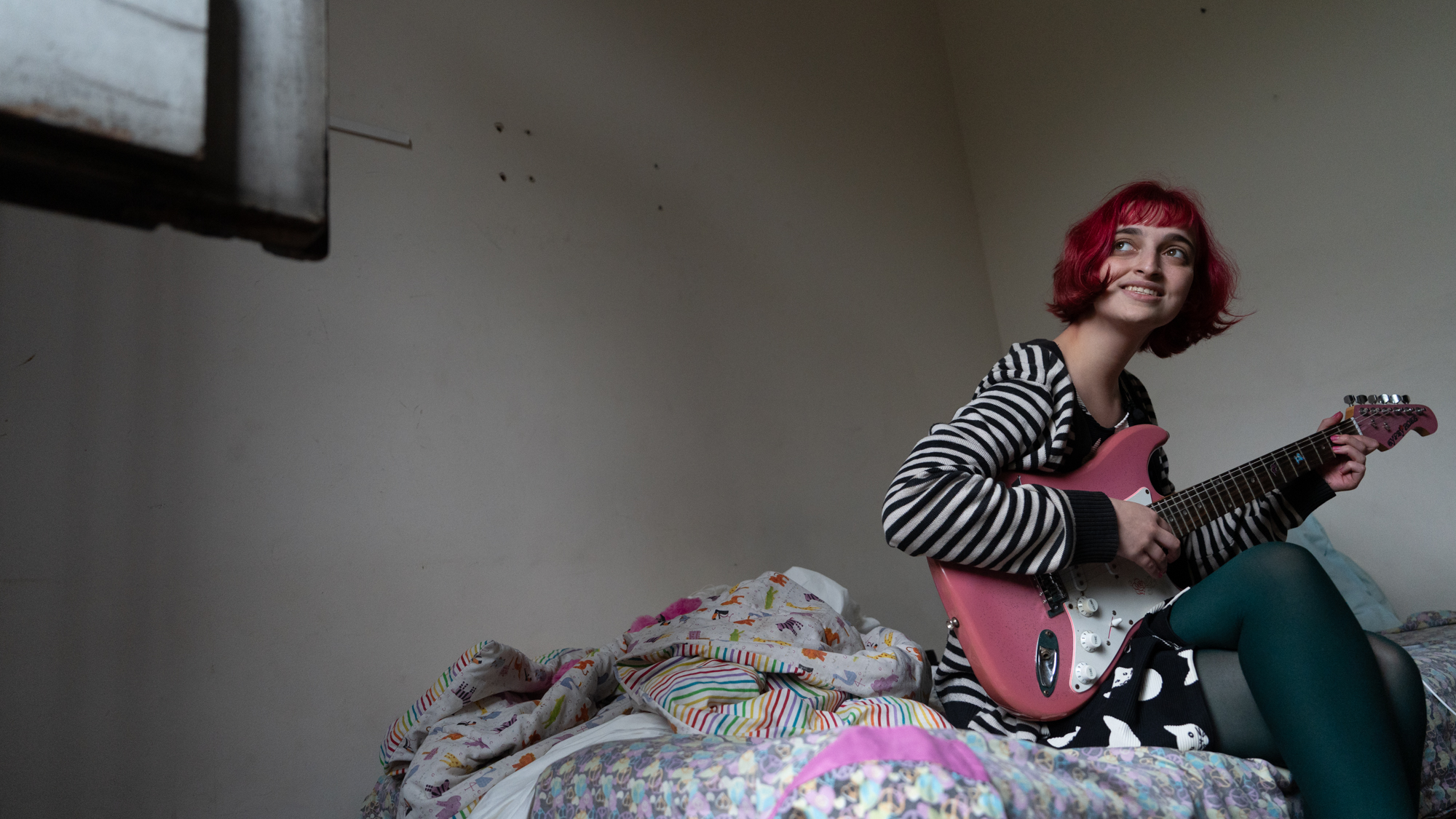Late afternoon light spills through the only window in Lola Tabarovsky’s third-floor apartment in the Abasto barrio, turning the small room the same cotton-candy pink as the sunset outside. The cracked white walls fade in places, and a quiet hum rises from the street.
Yet, inside, the noise and chaos of Buenos Aires feel far away. Her apartment is a world in itself. And it’s pink.
It’s pink like Lola’s hair, which is chopped short into a bob with uneven bangs. Her pink Converse shoes sit on a nearby bookshelf. Her guitar — which she plays as the lead singer in her pop band Homogénica — is pink, too, and plastered with butterfly stickers.
Nothing here is accidental.
“Some people think I’m naive,” Lola said. “But I think I’m on point.”
Her voice is quick and light but carries a self-confident weight — as if she’s caught somewhere between telling you a secret and starting a revolution. She glances at Celeste Nanfaro, her creative director and best friend, who nods along as Lola rifles through a crowded clothing rack. There’s a red sequined dress that glitters like a disco ball, an ’80s leather jacket cracked with age and passed down from her grandfather. And a pink tulle shirt, delicate but defiantly unapologetic.
“I am a feminist first,” Lola said. “And then I’m a musician, producer, student, woman — any of those things. I believe I put a feminist stamp on everything I do.”
Lola filmed her last music video here. Above her bed, old ’80s movie posters — “Footloose,” and “The Breakfast Club” — have been Photoshopped to include the names of songs her band hasn’t released yet. Little Easter eggs for the fans. The apartment is a collage of borrowed pasts and imagined futures, carefully arranged like an artist’s canvas.
But Lola’s work isn’t just about the past or the future. In the face of Argentina’s growing authoritarianism under President Javier Milei, Lola and other artists are channeling their frustrations into their music.

Buenos Aires’ underground music scene — which Lola and her peers call “el under” — isn’t a massive, commercial movement. It’s rebellious, anti-establishment and local. These aren’t arena-filling bands, but rather groups of young adults that thrive in intimate venues, small clubs and dive bars where they can build a grassroots “boca a boca” following. Their reach may not be massive, but their influence on local culture — providing authentic, unfiltered music that speaks directly to modern day struggles and frustrations — is undeniable.
And here’s the thing: Lola believes — no, knows — that music can offer an escape. That a pink guitar, a tulle shirt, a pop chorus you can scream along to can be equally reaffirming and cathartic.
Maybe that sounds small until you look outside her window.
Out there, under Milei, Argentina is unraveling. His libertarian government has gutted social programs. He’s slashed subsidies for housing, education and transportation. He’s cracking down on artists’ rights. On the streets of Buenos Aires, protests are now met with violent crackdowns.
But inside this small apartment, hope wears glitter and high heels.
And it refuses to be silenced.
"I am a feminist first. And then I’m a musician, producer, student, woman — any of those things."
CULTURAL ERASURE
Lola didn’t attend the march that Wednesday, but she saw its aftermath. She lives just a block from Congress, and on her walk home, she witnessed it all — dumpsters on fire, people running, panic in the air.
The “Marcha de los Jubilados” — a weekly protest in Buenos Aires against Milei-backed austerity measures — turned violent on March 12. Argentine police responded with tear gas, rubber bullets and water cannons. The crackdown, condemned by the Inter-American Commission on Human Rights, left 20 injured. An 87-year-old woman sustained head trauma. Photojournalist Pablo Grillo was seriously wounded and hospitalized after being struck by a tear gas canister.
For Lola, it was a reminder of how much things have escalated under Milei.
“I just felt this climate that I had never felt before in my life,” she said. “Keep in mind, I’m a person that has gone to marches since I was 12. This is the first time I felt truly bad and scared.”
Cultural critic and feminist activist Cecilia Palmeiro described the violence as a potential breaking point.
“They fucked up,” Palmeiro said. “Nobody could support the violence yesterday. You have to be a real coward to attack people that can barely walk.”
This repression is taking place amid massive transformations under Milei. His austerity measures have stabilized inflation but plunged millions into unemployment and poverty. His government has attacked social movements, dismissed LGBTQ+ rights and dismantled protections against gender-based violence.
Artists who speak out against any of this may face consequences.
Lali Espósito, considered Argentina’s Taylor Swift, learned this firsthand. A feminist and LGBTQ+ ally, Espósito has never been Milei’s loudest critic. After his August 2023 primary victory, she tweeted, “How dangerous, how sad.”
That was enough. Milei retaliated, smearing her as a “parasite” of the state.
“Our president is going against specific individuals for being against the government,” Lola said, “and the thing is these people are not even that against the government. It's not like Lali is the biggest queer feminist… she's literally just a girl.”
Rising rap star Milo J faced similar repression. When he planned a show at the ex-ESMA memorial site — once a torture center under Argentina’s 1980s military junta dictatorship — Milei’s government blocked it, sparking outrage and accusations of censorship.

This crackdown on culture assault echoes Argentina’s past. Under the military junta (1976-1983), artists were censored, exiled or disappeared. Today, Milei’s administration engages in a similar form of erasure — downplaying human rights violations of that era. Milei has slashed funding for the National Genetic Database, which identifies the remains of the military dictatorship’s victims, and closed the National Identity Commission’s investigation unit for forced disappearances.
Milei isn’t just attacking artists. He’s trying to rewrite history.
For Lola, it feels like a “massive extinction” — erasing the past and, at the same time, the power of artists to document the present.
Like so many others in Argentina’s underground scene, Lola’s using her music to preserve what the government is trying to erase.
DEEP SADNESS
At underground shows across Buenos Aires, the air is thick with smoke, sweat and something harder to define — something electric. The government may be cracking down on public dissent, but in these cramped “DIY” venues, the resistance is louder than ever.
On stage with her band, Lola grips the mic and surveys the crowd — a sea of young faces cheering, reaching their arms out.
“Pide mas” is the song. It’s one of her favorites to perform. The track is about dating men in the music scene. But really, it’s about male arrogance — the kind that bleeds into nearly everything, from a house party to the halls of power. By the end of the song, Lola throws herself to the floor. She screams. The crowd yells, too. Lola can’t even hear herself over it.
And in a country ruled by machismo, under a president who mocks feminism, that kind of release feels radical.
For Argentina’s underground artists, the fight against Milei isn’t abstract — although their art may be. His policies have directly impacted the arts. In March, his administration deregulated royalty collection through collective management societies that support artists with pensions, financial aid and legal services. In August, he removed copyright fees for music in private spaces like hotels and parties, a move critics say cuts a vital income source for artists.
“The current state of politics changed everything,” Lola said. “It really changed everything.”
For independent musicians, this isn’t just about differing political ideology — it’s a matter of survival. Before, struggling artists could apply for subsidies from the National Fund of the Arts or the Ministry of Culture, Lola said.
Now, thanks to Milei’s dismantling and defunding of public cultural institutions, those lifelines don’t exist.
“What has impacted us the most is not only the political decisions that Milei has made, but also that we are affected by the [economic] crisis just like everyone else — like a teacher, like everyone — and we have no money,” Lola said. “And the bands can't do anything. The bands can't plan to create an album, put on a big show, or do anything because they literally can't afford it.”
That sense of limitation weighs on not just Lola, but the scene as a whole, with many underground musicians channeling their frustration into their lyrics.
Sofía Szlago, a singer and bassist in the Buenos Aires band Apoyo Emocional, said politics are affecting young people in Argentina “so much, even emotionally.”
“We’re exhausted,” Szlago said. “I think this happens everywhere in the world, but in Argentina, I think it’s the first time we’re experiencing it with such deep sadness.”
Sakatumba, another neo-rock band, describes its music as speaking to the typical 23-year-old Argentine — broke and burdened with worries about the future. Buenos Vampiros, from Mar del Plata and set to debut this year in Europe, explore the tension between light and darkness in both their sound and themes. Their song "Desmotivada" captures the feelings of young people who are "desmotivada, triste y aburrida" — unmotivated, sad and bored.
Take Fama y Guita, a queer punk duo known for their chaotic live shows, biting humor and genre mashups that range from cumbia to hard bass. Described as both a band and a party, their songs — like the ferociously satirical “Yankees de Mierda!” — mock neoliberalism and cultural pretension with a wink and a scream.
Songs from Underground
But the "under" isn’t defined by one sound or style. Where Fama y Guita choose irony and volume, Lola leans into vulnerability and glitter.
“Many of the bands — not mine, but many of the bands in the under scene — are quite pessimistic,” Lola said. “Their lyrics tend to reflect that…. I think the worst and most brutal aspect of Milei’s government regarding music isn’t censorship of Lali. It’s how they’ve left us so poor and struggling that we can’t even make music.
It’s a bit disillusioning.”
"We’re exhausted. I think this happens everywhere in the world, but in Argentina, I think it’s the first time we’re experiencing it with such deep sadness."
THE “UNDER”
Even in this moment of exhaustion and uncertainty, Buenos Aires’ underground scene refuses to fade.
At a show on March 12 — the same day violence erupted at a previously peaceful protest — Strummer Bar pulsed with movement. Beyond the sticker-adorned metal doors in an otherwise unassuming alley, voices raised in a collective, defiant chorus. Kill Flora took the stage, their music weaving between soft, lilting melodies and a raw, abrasive energy.
Singer-songwriter duo Ana Julia Gonzalez Sastre and Lucía Szellner conceived the band as a form of catharsis. Some of their songs are melancholic and dreamlike, underscored by a sense of disillusionment. Others are deliberately absurd, wielding female sexuality like a blunt instrument meant to both provoke and amuse. Their song “Pussy Pancake” — the alliterative phrase repeated no fewer than 20 times in under three minutes — is an anthem of sexual liberation. On that evening at Strummer Bar, it sent young men and women alike into a frenzy of moshing, headbanging and laughing.
Lola was in that crowd, her pink bob bouncing as she danced and sang along. She wasn’t on stage that evening, but she didn’t have to be. The music — the movement — is bigger than any one person.
By 10:20 p.m., the show was over (early by Buenos Aires standards) and the fans spilled out into the humid night, trading cigarettes and plotting their next move. 17-year-old Santino Isnardes and his friends, who had just dominated the mosh pit, spoke about the impact of artists and spaces like this.
“The ‘under’ is a symbol of the emerging scene right now,” Isnardes said. “The main idea is to say what’s happening. To say what you want to say, what you need to say. I think the underground is really important right now… it’s the voice of a lot of young people.”
It’s a big part of what keeps Lola going. The music and fans, of course, but also her recent signing with the label Geiser.
"The ‘under’ is a symbol of the emerging scene right now. The main idea is to say what’s happening. To say what you want to say, what you need to say. I think the underground is really important right now… it’s the voice of a lot of young people."
For years, Lola’s dream was to sign with this label. Every time she saw a shooting star or blew out birthday candles, she’d wish for this.
Geiser doesn’t usually work with artists like her — she’s not as well-connected and doesn’t fit their typical sound — but Lola’s networking paid off. It all came together during a big show in February, where the Geiser team was in attendance.
“It was like a movie moment, everything slowed down… and I had never felt so present,” she said of that performance. “Everything was where it needed to be.”
Homogénica’s official signing took place on April 20. Right now, they’re collaborating with Geiser on their next album.
The government may be tightening its grip, rewriting history and silencing dissent. But in the underground clubs, in the pink-washed walls of Lola’s third-floor apartment and in a chorus of voices screaming lyrics into the void, something else is taking shape — a record of the present and a blueprint for the future.
And that, in its own way, is a kind of revolution.

